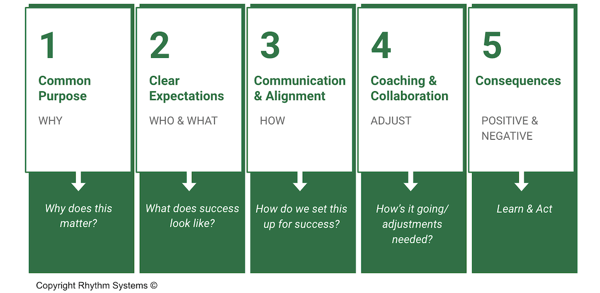At Rhythm Systems, we are all about helping companies and teams achieve their dreams and goals.
We have the systems and skills to help them remain focused, aligned, and accountable for getting things done. Developing accountable leaders and teams is a big piece of the puzzle for companies that want to achieve their growth goals consistently. You can be lucky for a while, but you need the right people operating off the right playbook for sustained, predictable success.
That's why we've built out a framework for Team Accountability. We call it the 5 Cs: Common Purpose, Clear Expectations, Communication and Alignment, Coaching and Collaboration, and Consequences and Results. On the surface, it's a simple framework, but in practical application, it can change the game for teams and leaders. I love this model because you can apply it universally and gain value from looking at a situation or project through this lens.
Team Accountability Framework:
The best real-life examples of accountability are from our lived experience, so I'll share my story in the spirit of transparency. Last year, my team took on a project to audit and simplify our internal systems. We reached a point where we kept adding on systems, which was too much. We could better scale our operations, be more productive, and save money by making some changes—but change is hard, and our team is hectic. So, to set the project up for success, I launched the new initiative using the framework of the 5 Cs:
Common Purpose:
Before announcing any changes, I involved all the key stakeholders. I asked them about their current process in our systems and learned what they liked and didn't like. I started by explaining why we were working on the project. I outlined why this initiative was necessary for the longer-term goals of our company, our team, and each individual involved.
Clear Expectations:
Once we had defined why, we clarified the project's scope. Our cross-functional project team created priorities in Rhythm with Red-Yellow-Green success criteria that clearly outlined our goals, deadlines, and dependencies. We carefully considered the best timing for making changes based on when the team was available.
Communication and Alignment:
We worked hard to ensure the key stakeholders were informed about critical information and shared information weekly with the broader team in our Weekly Meeting. Since we included quarterly priorities around researching, testing, and rolling out new systems, anyone in our company could review the weekly progress in our Rhythm dashboard. A project like this one impacts all areas of the company; we were changing systems that would impact Sales and Service, and that needed the help of our Finance team. When it came time to roll out the new systems, we did training in a group setting with one-on-one follow-up, and we created written documentation of the steps involved in using the latest techniques. We tried to address the different communication styles and preferences by delivering our message in various ways, and we closed the loop by inspecting whether the team members were adopting the new systems the way we had planned.
Coaching and Collaboration:
When we found that a few team members needed to start using the new, too, weren't inspected, we reached out to coach them. We asked questions to determine if they were not complying with the latest systems because they needed more skill or understanding. Once we understood the problem, we worked with the person to figure out what else we could do to help them be successful in the new systems. We also had opportunities for the larger team to share feedback and collaborate on best practices in the latest tools.
Consequences and Results:
We celebrated the success of the nearly year-long effort to streamline our internal systems! Not only did we find ways to save thousands of dollars for the company, but we were also able to point to concrete time-savers and more seamless internal communication that resulted in a better experience for our clients. We celebrated our success in one of our monthly company meetings. All team members must be held accountable to drive performance.
If you are intentional at the outset of a new project and use the 5 Cs of Team Accountability as your framework, you can save many headaches. Alternatively, the 5 Cs are also a great coaching tool when things aren’t going according to plan.
Team Accountability Video
Here’s an Example of how to use the 5 Cs Accountability Framework:
Again, I will use an example I know well but change the name to protect the innocent. :) A new hire on a sales team - we’ll call him Alex - was a project to make some phone calls to hot prospects on a Friday morning. The following week, the salesperson’s manager - Susan - followed up to see how the calls went, only to find out that the person hadn’t done it yet. Thankfully, Susan had a coach who helped her apply the 5 Cs.
They walked through the model together to find where there was a breakdown.
- Common Purpose: Susan thought it would be evident that it was essential to make the calls so that Alex could close deals, hit his quota, get his commission, and help the company’s bottom line. Hocompany'se didn’t share why it was not to call these people right away - they were hot leads from an event that took place the day before, and if they weren’t contacted soon, they wouldn't lose interest.
- Clear Expectations: Susan recognized that she had failed to provide a specific time frame for making the calls and had not clearly outlined the process for this particular project.
- Communication and Alignment: While Susan thought she was communicating clearly by providing a list of names and numbers and asking Alex to make follow-up calls, she realized that she could have slowed down, shared the expectations around getting it done on the same day, and explained why this was important to do now. She also didn’t verify that Alex understood the assignment.
- Coaching and Collaboration: Upon reflection, it became clear to Susan that Alex wasn't ignoring or intent on letting her down. Susan needed to coach Alex and share responsibility for Alex's poor performance in Alex's case. Rather than punishing Alex for not getting it done, Susan could share that she had failed to communicate well and work with Alex on a plan to ensure they were more closely aligned in the future. She committed to slowing down, and he committed to asking clarifying questions and responding to her requests more quickly when needed. Many teams benefit from skip-level meetings; check out our excellent skip-level meeting questions.
- Consequences and Results: Alex failed to follow through, so the company missed opportunities. However, Susan had a breakthrough in her management style and learned a valuable framework to help prevent this kind of thing from happening.
Leadership Accountability
Thinking through this framework can help you as a leader understand where you may play a role in contributing to the problem or where you can better support your team. Using the framework, you can be sure you’ve done everything to set your team up for success. If you continue to have the same problem over and over with the same person, even after running the issue through the 5 Cs, then you can apply consequences - like letting the person go - with confidence that you did all you could to set them up for success. Are you looking for other solutions? We have a leaders and teams accountability workshop that can help!




